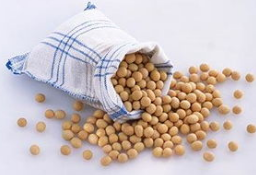- 阅读
- 阅读
- 技巧
- 百科
- 试题
- 文化
- 技能
"We've been gambling up to this point," says Tim Bardole, a soyabean farmer from Iowa.
“到目前为止,我们一直在赌,”蒂姆·巴多尔,一名来自爱荷华州的豆农说到。
After the price of soyabeans crashed last summer, he held on to most of his harvest and waited for the market to recover.
自去年夏天大豆价格暴跌后,他留下了自己的大部分大豆收成,等着市场恢复。
But seven months later, and with large loans to repay, he sold up. "We decided we'd better take what we have," he says.
但是七个月后,他偿还完大额贷款便把手头的大豆都卖掉了。“我们认为我们最好是见好就收。”他表示。

In January Liu He, China's deputy prime minister, said China would buy 5m tonnes of soyabeans after meeting Mr Trump.
1月,中国副总理刘鹤在和特朗普会面后称中国将购买5百万公吨大豆。
Even so, the pace of Chinese purchases is a fraction of what it would ordinarily be around this time of year.
即便如此,中国采购的步调不过是往常这个时候一小部分。
If the tariffs are lifted, some Chinese demand will recover.
如果免除关税,中国的一些需求将恢复。
The billions of dollars' worth of infrastructure that facilitates American sales to China is still in place.
促进美国对中国销售的价值上亿美元的基础设施仍存在。
And China could turn back to America for other reasons.
中国可能会因其他原因而再次转向美国。
To cope with the loss of American exports of soyabeans, for instance, it has lowered the minimum protein content in pig feed.
例如为了解决美国大豆出口的损失,中国降低了猪饲料中的蛋白质最低含量。
But that risks hogs' health and can stunt their growth.
但这是拿猪猪的健康冒险,还会阻碍它们的生长。
Furthermore, Chinese pig farms have been hit by a nasty bout of African swine fever, forcing farmers to cull 5-15% of their hogs,
此外,中国的养猪场受非洲猪瘟打击,养猪农被迫宰掉了5-15%的猪,
according to Michael Magdovitz of Rabobank, a firm that specialises in financing agriculture. But this should prove temporary.
专注农业融资的公司Rabobank的Michael Magdovitz说到。但是事实证明这只是暂时的。
Despite all this, many are sceptical that Chinese demand will ever fully recover.
尽管如此,很多人都怀疑中国需求是否能够最终完全恢复。
"It was nice" to have guaranteed demand from China, says Mr Bardole, but "those days are gone."
得到中国的需求保证“固然是好事”,巴多尔说到,但“好日子一去不复返了。”
Others worry that the Chinese will respond to this episode by investing more in developing Brazilian agricultural infrastructure,
其他人担心中国将在开发巴西农业基础设施上投入更多并以此回应这一事件,
permanently decreasing their reliance on America.
最终永久减少他们对美国的依赖。
Not everyone is pessimistic. The current situation "is nothing compared with what we went through in the 1980s," says Randy Souder, another Iowan farmer.
并不是每个人都如此悲观。目前的形式“和20世纪80年代我们所经历的相比不值一提,”另一名爱荷华州农民兰迪·苏德说到。
He remembers that he coped with low prices then by producing more efficiently.
他还记得那时他靠着提高生产效率的方式应对低价。
If some farmers are forced out of business, he reckons others will "pick up the acres" and spread their equipment costs over a larger area of land.
如果一些农民被迫歇业,他认为其他人将“接手这些土地”并将他们的设备成本分散到更大面积的土地上。
Prices have crept up in recent months.
近几个月,价格上升了。
Mr Magdovitz says they have been supported by the limited Chinese purchases, optimism that a deal will be agreed and Mr Trump's subsidies.
Magdovitz表示他们已经得到了中国有限购买量以及特朗普补助金的支持,并乐观认为两国将达成协议。
America's economy as a whole may not depend on exporting to China. But if recent experience is anything to go by, soyabeans are an exception.
美国整体经济可能并不依赖于对中国的出口。但如果近期经验靠得住的话,那么大豆是个例外。
来源:经济学人
参与评论